Level 5 Diploma in Education and Training Assignment Report
VerifiedAdded on 2023/06/10
|22
|6726
|161
Report
AI Summary
This report, a Level 5 Diploma in Education and Training assignment, delves into key aspects of education and training. It defines professionalism and dual professionalism, exploring their influence on teaching human resource management. The report examines the impact of social, political, and economic factors on education policy, alongside an analysis of organizational policies, codes of practice, and guidelines. Furthermore, the report investigates the roles of stakeholders and external bodies, including their impact on curriculum design, delivery, and assessment. It also scrutinizes quality improvement and assurance arrangements, evaluating a learning program and identifying areas for improvement based on evaluation outcomes. The assignment provides a comprehensive overview of educational practices, policies, and quality control measures.
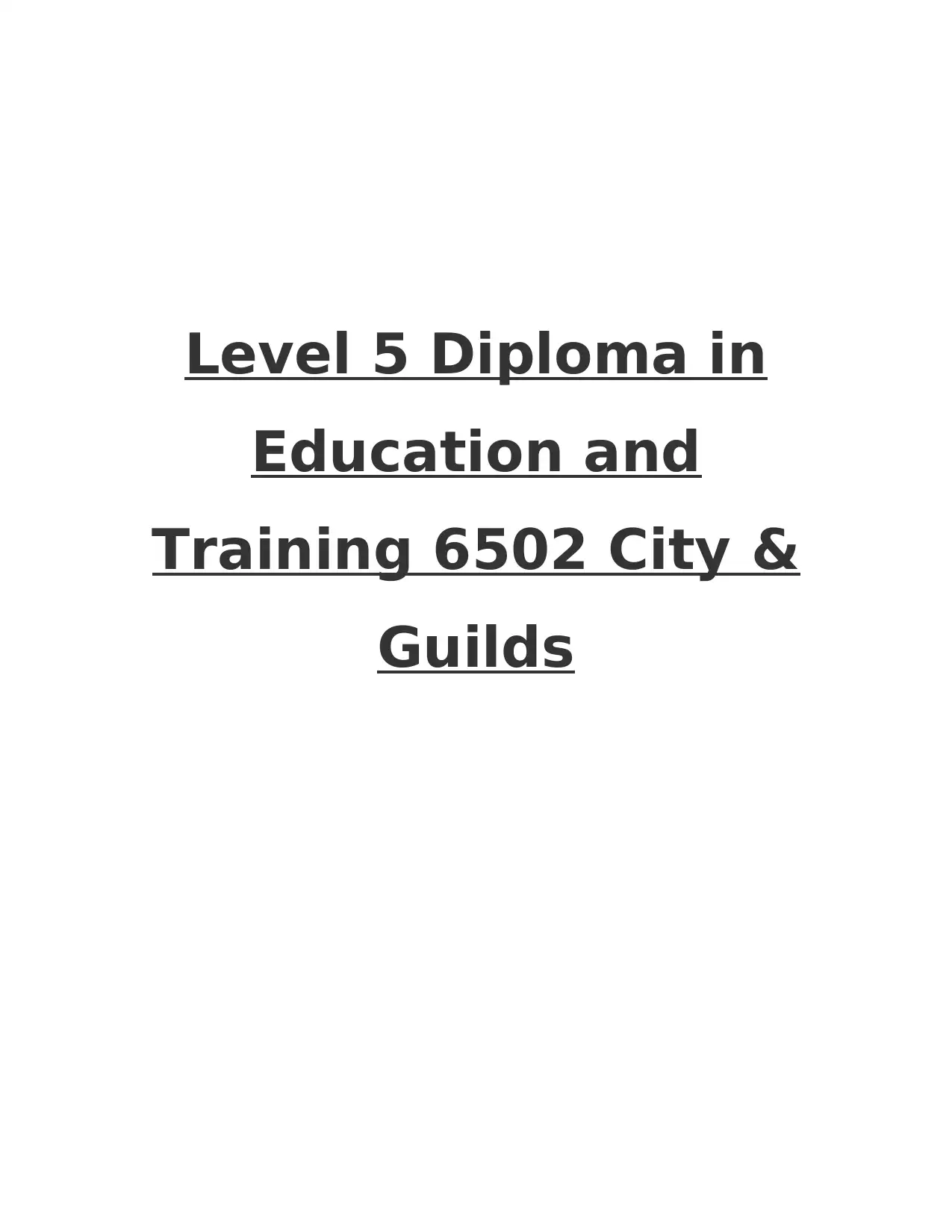
Level 5 Diploma in
Education and
Training 6502 City &
Guilds
Education and
Training 6502 City &
Guilds
Paraphrase This Document
Need a fresh take? Get an instant paraphrase of this document with our AI Paraphraser
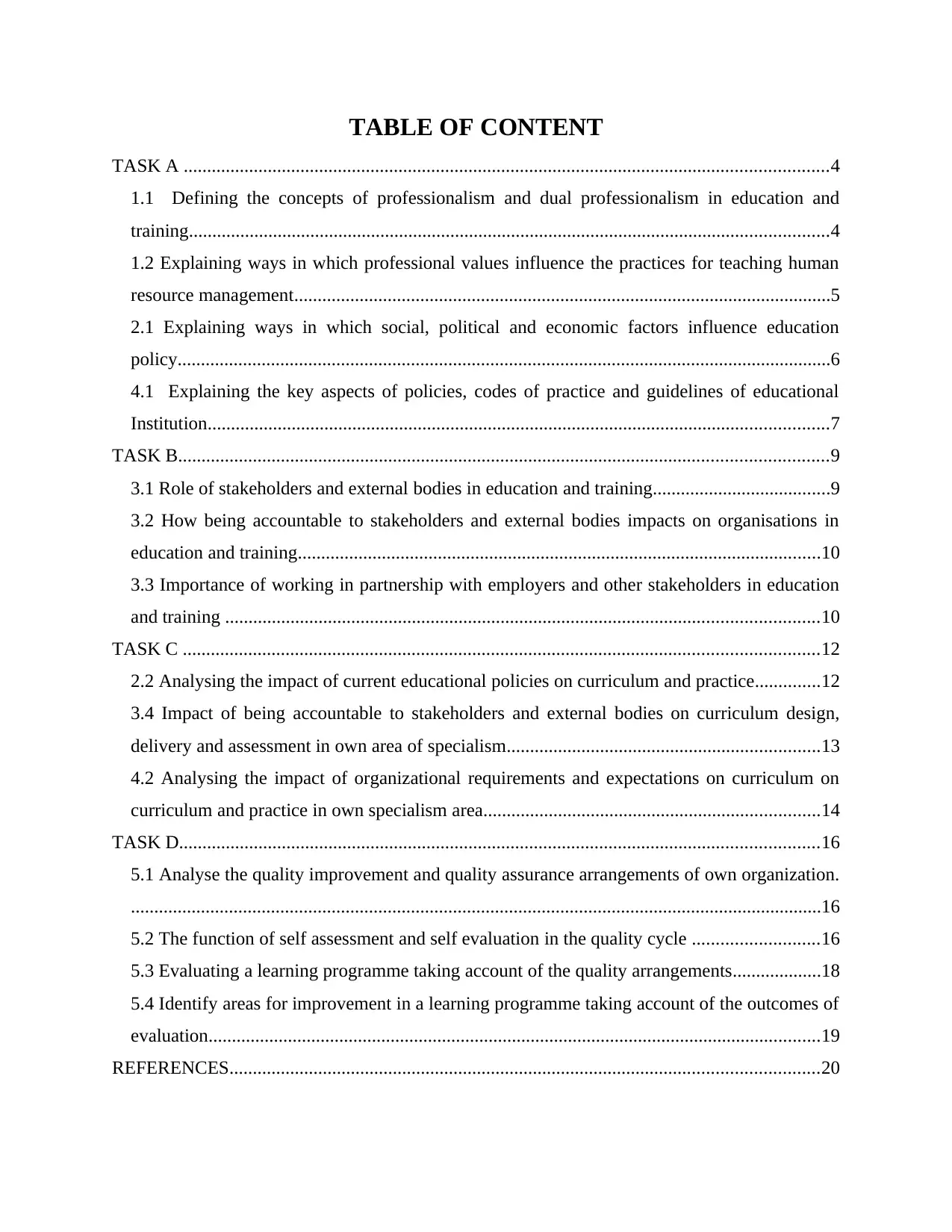
TABLE OF CONTENT
TASK A ..........................................................................................................................................4
1.1 Defining the concepts of professionalism and dual professionalism in education and
training.........................................................................................................................................4
1.2 Explaining ways in which professional values influence the practices for teaching human
resource management...................................................................................................................5
2.1 Explaining ways in which social, political and economic factors influence education
policy............................................................................................................................................6
4.1 Explaining the key aspects of policies, codes of practice and guidelines of educational
Institution.....................................................................................................................................7
TASK B...........................................................................................................................................9
3.1 Role of stakeholders and external bodies in education and training......................................9
3.2 How being accountable to stakeholders and external bodies impacts on organisations in
education and training................................................................................................................10
3.3 Importance of working in partnership with employers and other stakeholders in education
and training ...............................................................................................................................10
TASK C ........................................................................................................................................12
2.2 Analysing the impact of current educational policies on curriculum and practice..............12
3.4 Impact of being accountable to stakeholders and external bodies on curriculum design,
delivery and assessment in own area of specialism...................................................................13
4.2 Analysing the impact of organizational requirements and expectations on curriculum on
curriculum and practice in own specialism area........................................................................14
TASK D.........................................................................................................................................16
5.1 Analyse the quality improvement and quality assurance arrangements of own organization.
....................................................................................................................................................16
5.2 The function of self assessment and self evaluation in the quality cycle ...........................16
5.3 Evaluating a learning programme taking account of the quality arrangements...................18
5.4 Identify areas for improvement in a learning programme taking account of the outcomes of
evaluation...................................................................................................................................19
REFERENCES..............................................................................................................................20
TASK A ..........................................................................................................................................4
1.1 Defining the concepts of professionalism and dual professionalism in education and
training.........................................................................................................................................4
1.2 Explaining ways in which professional values influence the practices for teaching human
resource management...................................................................................................................5
2.1 Explaining ways in which social, political and economic factors influence education
policy............................................................................................................................................6
4.1 Explaining the key aspects of policies, codes of practice and guidelines of educational
Institution.....................................................................................................................................7
TASK B...........................................................................................................................................9
3.1 Role of stakeholders and external bodies in education and training......................................9
3.2 How being accountable to stakeholders and external bodies impacts on organisations in
education and training................................................................................................................10
3.3 Importance of working in partnership with employers and other stakeholders in education
and training ...............................................................................................................................10
TASK C ........................................................................................................................................12
2.2 Analysing the impact of current educational policies on curriculum and practice..............12
3.4 Impact of being accountable to stakeholders and external bodies on curriculum design,
delivery and assessment in own area of specialism...................................................................13
4.2 Analysing the impact of organizational requirements and expectations on curriculum on
curriculum and practice in own specialism area........................................................................14
TASK D.........................................................................................................................................16
5.1 Analyse the quality improvement and quality assurance arrangements of own organization.
....................................................................................................................................................16
5.2 The function of self assessment and self evaluation in the quality cycle ...........................16
5.3 Evaluating a learning programme taking account of the quality arrangements...................18
5.4 Identify areas for improvement in a learning programme taking account of the outcomes of
evaluation...................................................................................................................................19
REFERENCES..............................................................................................................................20

⊘ This is a preview!⊘
Do you want full access?
Subscribe today to unlock all pages.

Trusted by 1+ million students worldwide
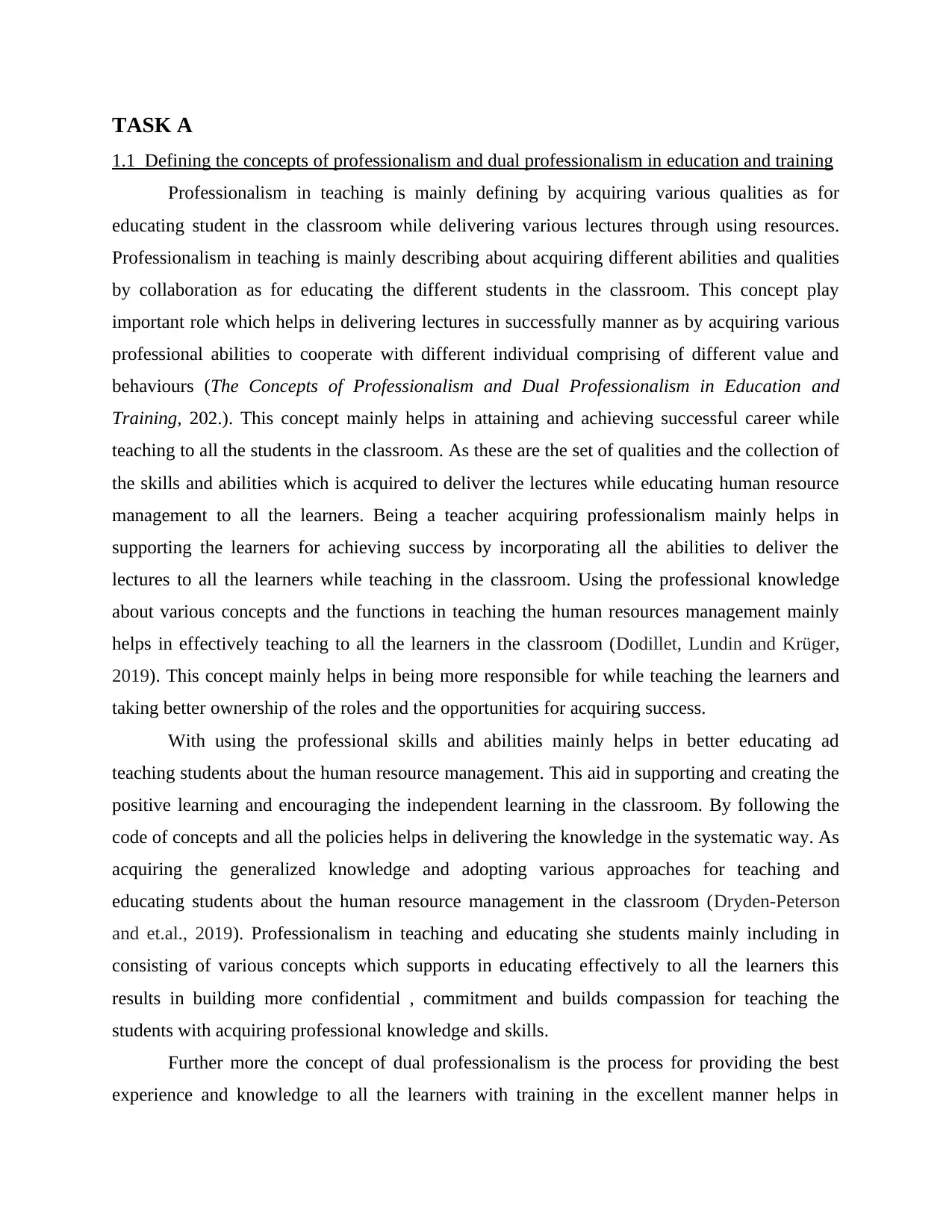
TASK A
1.1 Defining the concepts of professionalism and dual professionalism in education and training
Professionalism in teaching is mainly defining by acquiring various qualities as for
educating student in the classroom while delivering various lectures through using resources.
Professionalism in teaching is mainly describing about acquiring different abilities and qualities
by collaboration as for educating the different students in the classroom. This concept play
important role which helps in delivering lectures in successfully manner as by acquiring various
professional abilities to cooperate with different individual comprising of different value and
behaviours (The Concepts of Professionalism and Dual Professionalism in Education and
Training, 202.). This concept mainly helps in attaining and achieving successful career while
teaching to all the students in the classroom. As these are the set of qualities and the collection of
the skills and abilities which is acquired to deliver the lectures while educating human resource
management to all the learners. Being a teacher acquiring professionalism mainly helps in
supporting the learners for achieving success by incorporating all the abilities to deliver the
lectures to all the learners while teaching in the classroom. Using the professional knowledge
about various concepts and the functions in teaching the human resources management mainly
helps in effectively teaching to all the learners in the classroom (Dodillet, Lundin and Krüger,
2019). This concept mainly helps in being more responsible for while teaching the learners and
taking better ownership of the roles and the opportunities for acquiring success.
With using the professional skills and abilities mainly helps in better educating ad
teaching students about the human resource management. This aid in supporting and creating the
positive learning and encouraging the independent learning in the classroom. By following the
code of concepts and all the policies helps in delivering the knowledge in the systematic way. As
acquiring the generalized knowledge and adopting various approaches for teaching and
educating students about the human resource management in the classroom (Dryden-Peterson
and et.al., 2019). Professionalism in teaching and educating she students mainly including in
consisting of various concepts which supports in educating effectively to all the learners this
results in building more confidential , commitment and builds compassion for teaching the
students with acquiring professional knowledge and skills.
Further more the concept of dual professionalism is the process for providing the best
experience and knowledge to all the learners with training in the excellent manner helps in
1.1 Defining the concepts of professionalism and dual professionalism in education and training
Professionalism in teaching is mainly defining by acquiring various qualities as for
educating student in the classroom while delivering various lectures through using resources.
Professionalism in teaching is mainly describing about acquiring different abilities and qualities
by collaboration as for educating the different students in the classroom. This concept play
important role which helps in delivering lectures in successfully manner as by acquiring various
professional abilities to cooperate with different individual comprising of different value and
behaviours (The Concepts of Professionalism and Dual Professionalism in Education and
Training, 202.). This concept mainly helps in attaining and achieving successful career while
teaching to all the students in the classroom. As these are the set of qualities and the collection of
the skills and abilities which is acquired to deliver the lectures while educating human resource
management to all the learners. Being a teacher acquiring professionalism mainly helps in
supporting the learners for achieving success by incorporating all the abilities to deliver the
lectures to all the learners while teaching in the classroom. Using the professional knowledge
about various concepts and the functions in teaching the human resources management mainly
helps in effectively teaching to all the learners in the classroom (Dodillet, Lundin and Krüger,
2019). This concept mainly helps in being more responsible for while teaching the learners and
taking better ownership of the roles and the opportunities for acquiring success.
With using the professional skills and abilities mainly helps in better educating ad
teaching students about the human resource management. This aid in supporting and creating the
positive learning and encouraging the independent learning in the classroom. By following the
code of concepts and all the policies helps in delivering the knowledge in the systematic way. As
acquiring the generalized knowledge and adopting various approaches for teaching and
educating students about the human resource management in the classroom (Dryden-Peterson
and et.al., 2019). Professionalism in teaching and educating she students mainly including in
consisting of various concepts which supports in educating effectively to all the learners this
results in building more confidential , commitment and builds compassion for teaching the
students with acquiring professional knowledge and skills.
Further more the concept of dual professionalism is the process for providing the best
experience and knowledge to all the learners with training in the excellent manner helps in
Paraphrase This Document
Need a fresh take? Get an instant paraphrase of this document with our AI Paraphraser
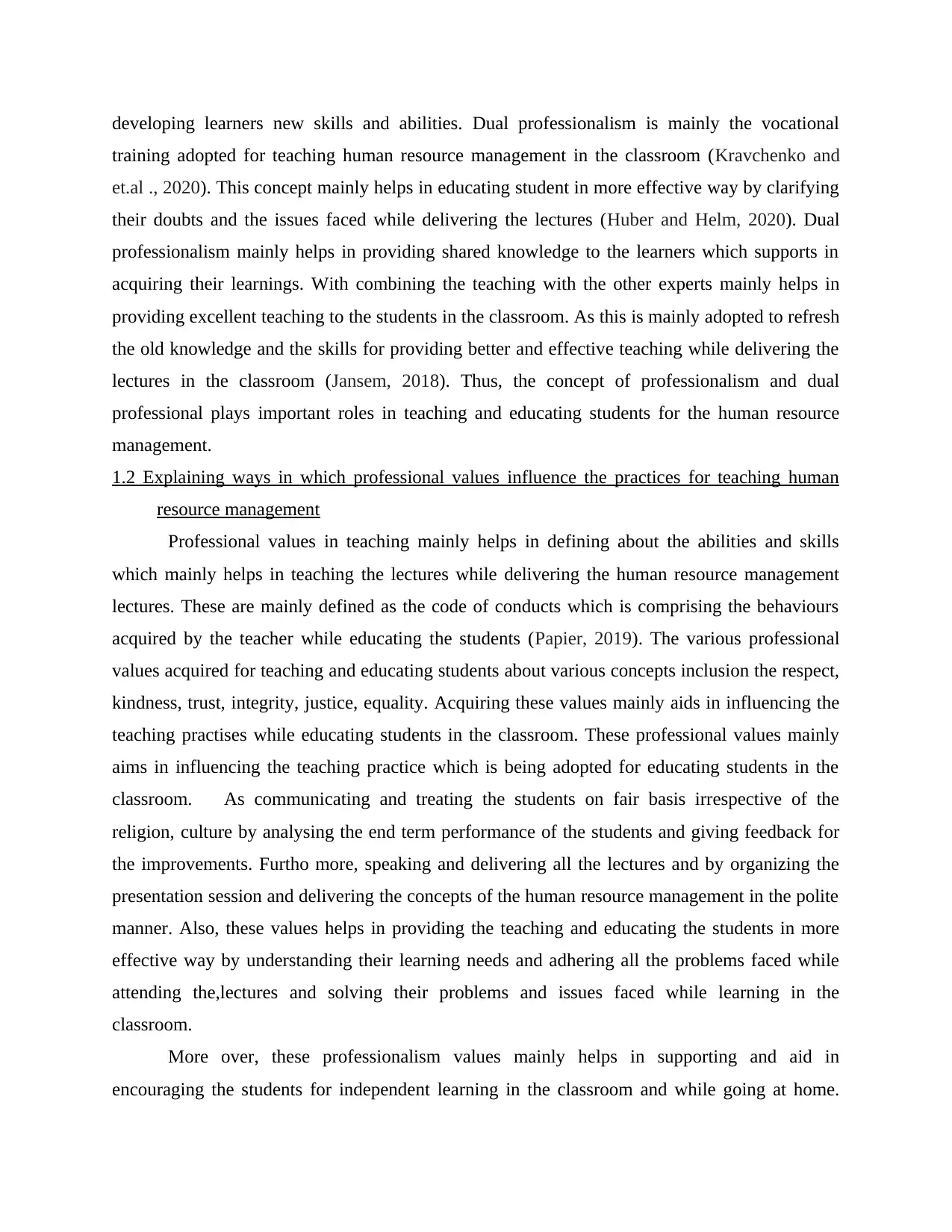
developing learners new skills and abilities. Dual professionalism is mainly the vocational
training adopted for teaching human resource management in the classroom (Kravchenko and
et.al ., 2020). This concept mainly helps in educating student in more effective way by clarifying
their doubts and the issues faced while delivering the lectures (Huber and Helm, 2020). Dual
professionalism mainly helps in providing shared knowledge to the learners which supports in
acquiring their learnings. With combining the teaching with the other experts mainly helps in
providing excellent teaching to the students in the classroom. As this is mainly adopted to refresh
the old knowledge and the skills for providing better and effective teaching while delivering the
lectures in the classroom (Jansem, 2018). Thus, the concept of professionalism and dual
professional plays important roles in teaching and educating students for the human resource
management.
1.2 Explaining ways in which professional values influence the practices for teaching human
resource management
Professional values in teaching mainly helps in defining about the abilities and skills
which mainly helps in teaching the lectures while delivering the human resource management
lectures. These are mainly defined as the code of conducts which is comprising the behaviours
acquired by the teacher while educating the students (Papier, 2019). The various professional
values acquired for teaching and educating students about various concepts inclusion the respect,
kindness, trust, integrity, justice, equality. Acquiring these values mainly aids in influencing the
teaching practises while educating students in the classroom. These professional values mainly
aims in influencing the teaching practice which is being adopted for educating students in the
classroom. As communicating and treating the students on fair basis irrespective of the
religion, culture by analysing the end term performance of the students and giving feedback for
the improvements. Furtho more, speaking and delivering all the lectures and by organizing the
presentation session and delivering the concepts of the human resource management in the polite
manner. Also, these values helps in providing the teaching and educating the students in more
effective way by understanding their learning needs and adhering all the problems faced while
attending the,lectures and solving their problems and issues faced while learning in the
classroom.
More over, these professionalism values mainly helps in supporting and aid in
encouraging the students for independent learning in the classroom and while going at home.
training adopted for teaching human resource management in the classroom (Kravchenko and
et.al ., 2020). This concept mainly helps in educating student in more effective way by clarifying
their doubts and the issues faced while delivering the lectures (Huber and Helm, 2020). Dual
professionalism mainly helps in providing shared knowledge to the learners which supports in
acquiring their learnings. With combining the teaching with the other experts mainly helps in
providing excellent teaching to the students in the classroom. As this is mainly adopted to refresh
the old knowledge and the skills for providing better and effective teaching while delivering the
lectures in the classroom (Jansem, 2018). Thus, the concept of professionalism and dual
professional plays important roles in teaching and educating students for the human resource
management.
1.2 Explaining ways in which professional values influence the practices for teaching human
resource management
Professional values in teaching mainly helps in defining about the abilities and skills
which mainly helps in teaching the lectures while delivering the human resource management
lectures. These are mainly defined as the code of conducts which is comprising the behaviours
acquired by the teacher while educating the students (Papier, 2019). The various professional
values acquired for teaching and educating students about various concepts inclusion the respect,
kindness, trust, integrity, justice, equality. Acquiring these values mainly aids in influencing the
teaching practises while educating students in the classroom. These professional values mainly
aims in influencing the teaching practice which is being adopted for educating students in the
classroom. As communicating and treating the students on fair basis irrespective of the
religion, culture by analysing the end term performance of the students and giving feedback for
the improvements. Furtho more, speaking and delivering all the lectures and by organizing the
presentation session and delivering the concepts of the human resource management in the polite
manner. Also, these values helps in providing the teaching and educating the students in more
effective way by understanding their learning needs and adhering all the problems faced while
attending the,lectures and solving their problems and issues faced while learning in the
classroom.
More over, these professionalism values mainly helps in supporting and aid in
encouraging the students for independent learning in the classroom and while going at home.
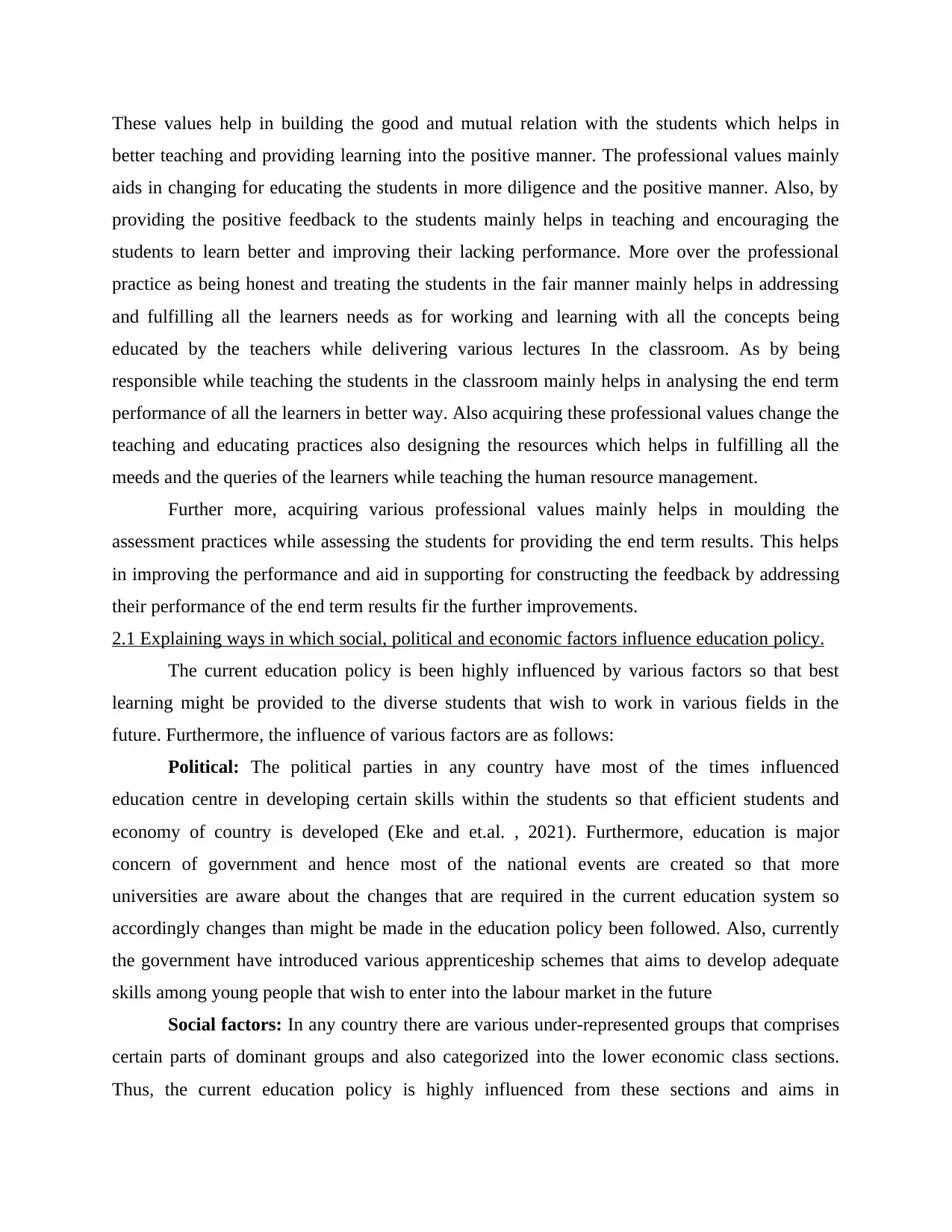
These values help in building the good and mutual relation with the students which helps in
better teaching and providing learning into the positive manner. The professional values mainly
aids in changing for educating the students in more diligence and the positive manner. Also, by
providing the positive feedback to the students mainly helps in teaching and encouraging the
students to learn better and improving their lacking performance. More over the professional
practice as being honest and treating the students in the fair manner mainly helps in addressing
and fulfilling all the learners needs as for working and learning with all the concepts being
educated by the teachers while delivering various lectures In the classroom. As by being
responsible while teaching the students in the classroom mainly helps in analysing the end term
performance of all the learners in better way. Also acquiring these professional values change the
teaching and educating practices also designing the resources which helps in fulfilling all the
meeds and the queries of the learners while teaching the human resource management.
Further more, acquiring various professional values mainly helps in moulding the
assessment practices while assessing the students for providing the end term results. This helps
in improving the performance and aid in supporting for constructing the feedback by addressing
their performance of the end term results fir the further improvements.
2.1 Explaining ways in which social, political and economic factors influence education policy.
The current education policy is been highly influenced by various factors so that best
learning might be provided to the diverse students that wish to work in various fields in the
future. Furthermore, the influence of various factors are as follows:
Political: The political parties in any country have most of the times influenced
education centre in developing certain skills within the students so that efficient students and
economy of country is developed (Eke and et.al. , 2021). Furthermore, education is major
concern of government and hence most of the national events are created so that more
universities are aware about the changes that are required in the current education system so
accordingly changes than might be made in the education policy been followed. Also, currently
the government have introduced various apprenticeship schemes that aims to develop adequate
skills among young people that wish to enter into the labour market in the future
Social factors: In any country there are various under-represented groups that comprises
certain parts of dominant groups and also categorized into the lower economic class sections.
Thus, the current education policy is highly influenced from these sections and aims in
better teaching and providing learning into the positive manner. The professional values mainly
aids in changing for educating the students in more diligence and the positive manner. Also, by
providing the positive feedback to the students mainly helps in teaching and encouraging the
students to learn better and improving their lacking performance. More over the professional
practice as being honest and treating the students in the fair manner mainly helps in addressing
and fulfilling all the learners needs as for working and learning with all the concepts being
educated by the teachers while delivering various lectures In the classroom. As by being
responsible while teaching the students in the classroom mainly helps in analysing the end term
performance of all the learners in better way. Also acquiring these professional values change the
teaching and educating practices also designing the resources which helps in fulfilling all the
meeds and the queries of the learners while teaching the human resource management.
Further more, acquiring various professional values mainly helps in moulding the
assessment practices while assessing the students for providing the end term results. This helps
in improving the performance and aid in supporting for constructing the feedback by addressing
their performance of the end term results fir the further improvements.
2.1 Explaining ways in which social, political and economic factors influence education policy.
The current education policy is been highly influenced by various factors so that best
learning might be provided to the diverse students that wish to work in various fields in the
future. Furthermore, the influence of various factors are as follows:
Political: The political parties in any country have most of the times influenced
education centre in developing certain skills within the students so that efficient students and
economy of country is developed (Eke and et.al. , 2021). Furthermore, education is major
concern of government and hence most of the national events are created so that more
universities are aware about the changes that are required in the current education system so
accordingly changes than might be made in the education policy been followed. Also, currently
the government have introduced various apprenticeship schemes that aims to develop adequate
skills among young people that wish to enter into the labour market in the future
Social factors: In any country there are various under-represented groups that comprises
certain parts of dominant groups and also categorized into the lower economic class sections.
Thus, the current education policy is highly influenced from these sections and aims in
⊘ This is a preview!⊘
Do you want full access?
Subscribe today to unlock all pages.

Trusted by 1+ million students worldwide
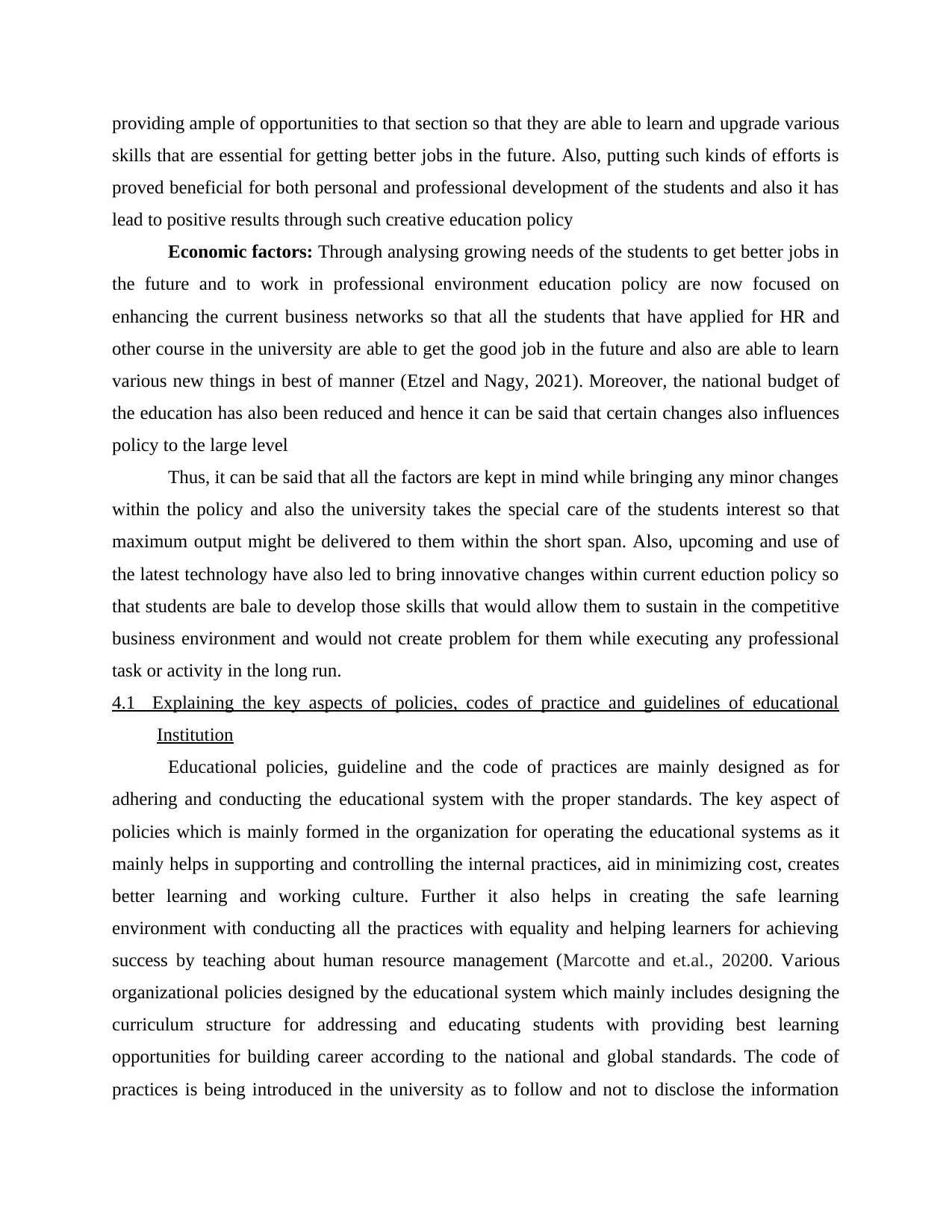
providing ample of opportunities to that section so that they are able to learn and upgrade various
skills that are essential for getting better jobs in the future. Also, putting such kinds of efforts is
proved beneficial for both personal and professional development of the students and also it has
lead to positive results through such creative education policy
Economic factors: Through analysing growing needs of the students to get better jobs in
the future and to work in professional environment education policy are now focused on
enhancing the current business networks so that all the students that have applied for HR and
other course in the university are able to get the good job in the future and also are able to learn
various new things in best of manner (Etzel and Nagy, 2021). Moreover, the national budget of
the education has also been reduced and hence it can be said that certain changes also influences
policy to the large level
Thus, it can be said that all the factors are kept in mind while bringing any minor changes
within the policy and also the university takes the special care of the students interest so that
maximum output might be delivered to them within the short span. Also, upcoming and use of
the latest technology have also led to bring innovative changes within current eduction policy so
that students are bale to develop those skills that would allow them to sustain in the competitive
business environment and would not create problem for them while executing any professional
task or activity in the long run.
4.1 Explaining the key aspects of policies, codes of practice and guidelines of educational
Institution
Educational policies, guideline and the code of practices are mainly designed as for
adhering and conducting the educational system with the proper standards. The key aspect of
policies which is mainly formed in the organization for operating the educational systems as it
mainly helps in supporting and controlling the internal practices, aid in minimizing cost, creates
better learning and working culture. Further it also helps in creating the safe learning
environment with conducting all the practices with equality and helping learners for achieving
success by teaching about human resource management (Marcotte and et.al., 20200. Various
organizational policies designed by the educational system which mainly includes designing the
curriculum structure for addressing and educating students with providing best learning
opportunities for building career according to the national and global standards. The code of
practices is being introduced in the university as to follow and not to disclose the information
skills that are essential for getting better jobs in the future. Also, putting such kinds of efforts is
proved beneficial for both personal and professional development of the students and also it has
lead to positive results through such creative education policy
Economic factors: Through analysing growing needs of the students to get better jobs in
the future and to work in professional environment education policy are now focused on
enhancing the current business networks so that all the students that have applied for HR and
other course in the university are able to get the good job in the future and also are able to learn
various new things in best of manner (Etzel and Nagy, 2021). Moreover, the national budget of
the education has also been reduced and hence it can be said that certain changes also influences
policy to the large level
Thus, it can be said that all the factors are kept in mind while bringing any minor changes
within the policy and also the university takes the special care of the students interest so that
maximum output might be delivered to them within the short span. Also, upcoming and use of
the latest technology have also led to bring innovative changes within current eduction policy so
that students are bale to develop those skills that would allow them to sustain in the competitive
business environment and would not create problem for them while executing any professional
task or activity in the long run.
4.1 Explaining the key aspects of policies, codes of practice and guidelines of educational
Institution
Educational policies, guideline and the code of practices are mainly designed as for
adhering and conducting the educational system with the proper standards. The key aspect of
policies which is mainly formed in the organization for operating the educational systems as it
mainly helps in supporting and controlling the internal practices, aid in minimizing cost, creates
better learning and working culture. Further it also helps in creating the safe learning
environment with conducting all the practices with equality and helping learners for achieving
success by teaching about human resource management (Marcotte and et.al., 20200. Various
organizational policies designed by the educational system which mainly includes designing the
curriculum structure for addressing and educating students with providing best learning
opportunities for building career according to the national and global standards. The code of
practices is being introduced in the university as to follow and not to disclose the information
Paraphrase This Document
Need a fresh take? Get an instant paraphrase of this document with our AI Paraphraser
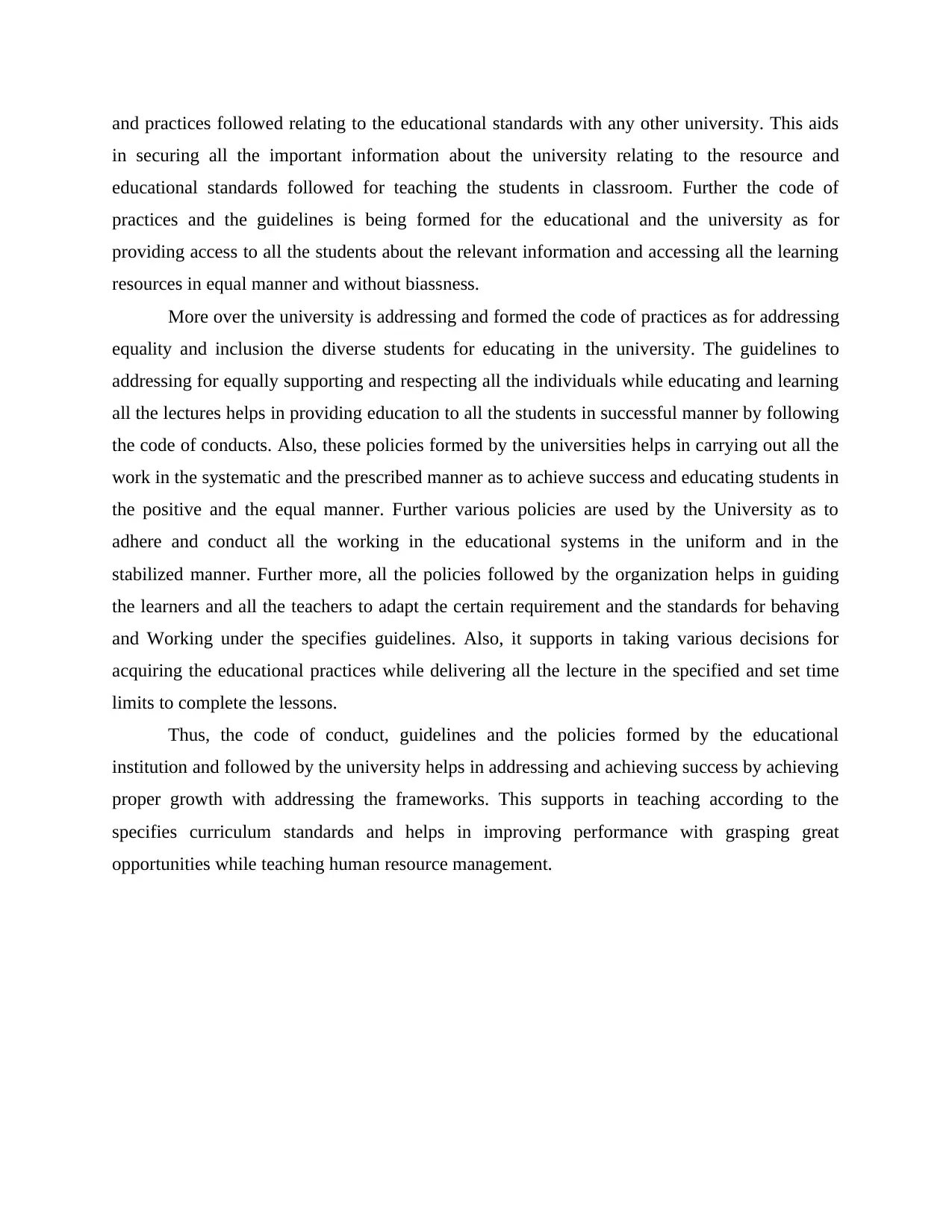
and practices followed relating to the educational standards with any other university. This aids
in securing all the important information about the university relating to the resource and
educational standards followed for teaching the students in classroom. Further the code of
practices and the guidelines is being formed for the educational and the university as for
providing access to all the students about the relevant information and accessing all the learning
resources in equal manner and without biassness.
More over the university is addressing and formed the code of practices as for addressing
equality and inclusion the diverse students for educating in the university. The guidelines to
addressing for equally supporting and respecting all the individuals while educating and learning
all the lectures helps in providing education to all the students in successful manner by following
the code of conducts. Also, these policies formed by the universities helps in carrying out all the
work in the systematic and the prescribed manner as to achieve success and educating students in
the positive and the equal manner. Further various policies are used by the University as to
adhere and conduct all the working in the educational systems in the uniform and in the
stabilized manner. Further more, all the policies followed by the organization helps in guiding
the learners and all the teachers to adapt the certain requirement and the standards for behaving
and Working under the specifies guidelines. Also, it supports in taking various decisions for
acquiring the educational practices while delivering all the lecture in the specified and set time
limits to complete the lessons.
Thus, the code of conduct, guidelines and the policies formed by the educational
institution and followed by the university helps in addressing and achieving success by achieving
proper growth with addressing the frameworks. This supports in teaching according to the
specifies curriculum standards and helps in improving performance with grasping great
opportunities while teaching human resource management.
in securing all the important information about the university relating to the resource and
educational standards followed for teaching the students in classroom. Further the code of
practices and the guidelines is being formed for the educational and the university as for
providing access to all the students about the relevant information and accessing all the learning
resources in equal manner and without biassness.
More over the university is addressing and formed the code of practices as for addressing
equality and inclusion the diverse students for educating in the university. The guidelines to
addressing for equally supporting and respecting all the individuals while educating and learning
all the lectures helps in providing education to all the students in successful manner by following
the code of conducts. Also, these policies formed by the universities helps in carrying out all the
work in the systematic and the prescribed manner as to achieve success and educating students in
the positive and the equal manner. Further various policies are used by the University as to
adhere and conduct all the working in the educational systems in the uniform and in the
stabilized manner. Further more, all the policies followed by the organization helps in guiding
the learners and all the teachers to adapt the certain requirement and the standards for behaving
and Working under the specifies guidelines. Also, it supports in taking various decisions for
acquiring the educational practices while delivering all the lecture in the specified and set time
limits to complete the lessons.
Thus, the code of conduct, guidelines and the policies formed by the educational
institution and followed by the university helps in addressing and achieving success by achieving
proper growth with addressing the frameworks. This supports in teaching according to the
specifies curriculum standards and helps in improving performance with grasping great
opportunities while teaching human resource management.
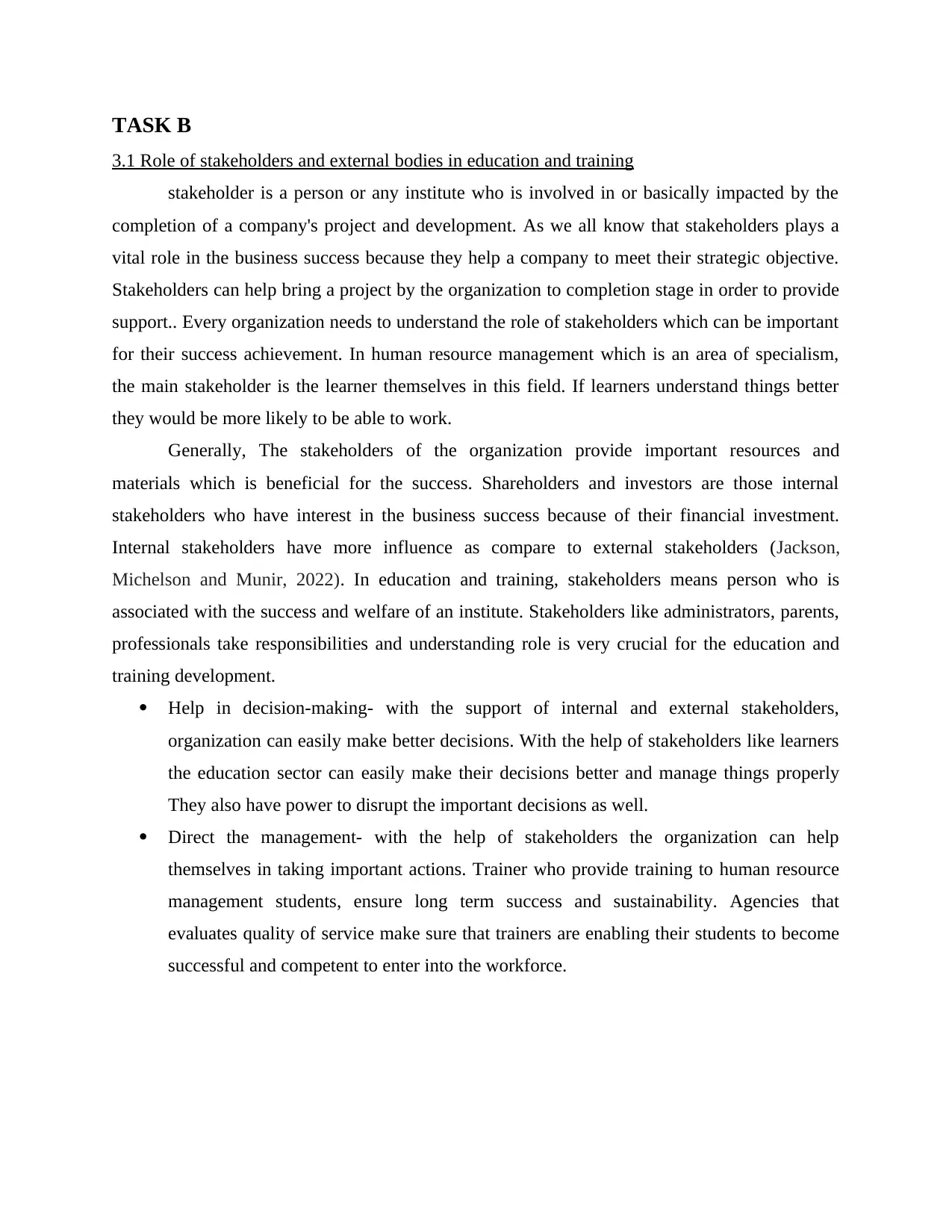
TASK B
3.1 Role of stakeholders and external bodies in education and training
stakeholder is a person or any institute who is involved in or basically impacted by the
completion of a company's project and development. As we all know that stakeholders plays a
vital role in the business success because they help a company to meet their strategic objective.
Stakeholders can help bring a project by the organization to completion stage in order to provide
support.. Every organization needs to understand the role of stakeholders which can be important
for their success achievement. In human resource management which is an area of specialism,
the main stakeholder is the learner themselves in this field. If learners understand things better
they would be more likely to be able to work.
Generally, The stakeholders of the organization provide important resources and
materials which is beneficial for the success. Shareholders and investors are those internal
stakeholders who have interest in the business success because of their financial investment.
Internal stakeholders have more influence as compare to external stakeholders (Jackson,
Michelson and Munir, 2022). In education and training, stakeholders means person who is
associated with the success and welfare of an institute. Stakeholders like administrators, parents,
professionals take responsibilities and understanding role is very crucial for the education and
training development.
Help in decision-making- with the support of internal and external stakeholders,
organization can easily make better decisions. With the help of stakeholders like learners
the education sector can easily make their decisions better and manage things properly
They also have power to disrupt the important decisions as well.
Direct the management- with the help of stakeholders the organization can help
themselves in taking important actions. Trainer who provide training to human resource
management students, ensure long term success and sustainability. Agencies that
evaluates quality of service make sure that trainers are enabling their students to become
successful and competent to enter into the workforce.
3.1 Role of stakeholders and external bodies in education and training
stakeholder is a person or any institute who is involved in or basically impacted by the
completion of a company's project and development. As we all know that stakeholders plays a
vital role in the business success because they help a company to meet their strategic objective.
Stakeholders can help bring a project by the organization to completion stage in order to provide
support.. Every organization needs to understand the role of stakeholders which can be important
for their success achievement. In human resource management which is an area of specialism,
the main stakeholder is the learner themselves in this field. If learners understand things better
they would be more likely to be able to work.
Generally, The stakeholders of the organization provide important resources and
materials which is beneficial for the success. Shareholders and investors are those internal
stakeholders who have interest in the business success because of their financial investment.
Internal stakeholders have more influence as compare to external stakeholders (Jackson,
Michelson and Munir, 2022). In education and training, stakeholders means person who is
associated with the success and welfare of an institute. Stakeholders like administrators, parents,
professionals take responsibilities and understanding role is very crucial for the education and
training development.
Help in decision-making- with the support of internal and external stakeholders,
organization can easily make better decisions. With the help of stakeholders like learners
the education sector can easily make their decisions better and manage things properly
They also have power to disrupt the important decisions as well.
Direct the management- with the help of stakeholders the organization can help
themselves in taking important actions. Trainer who provide training to human resource
management students, ensure long term success and sustainability. Agencies that
evaluates quality of service make sure that trainers are enabling their students to become
successful and competent to enter into the workforce.
⊘ This is a preview!⊘
Do you want full access?
Subscribe today to unlock all pages.

Trusted by 1+ million students worldwide
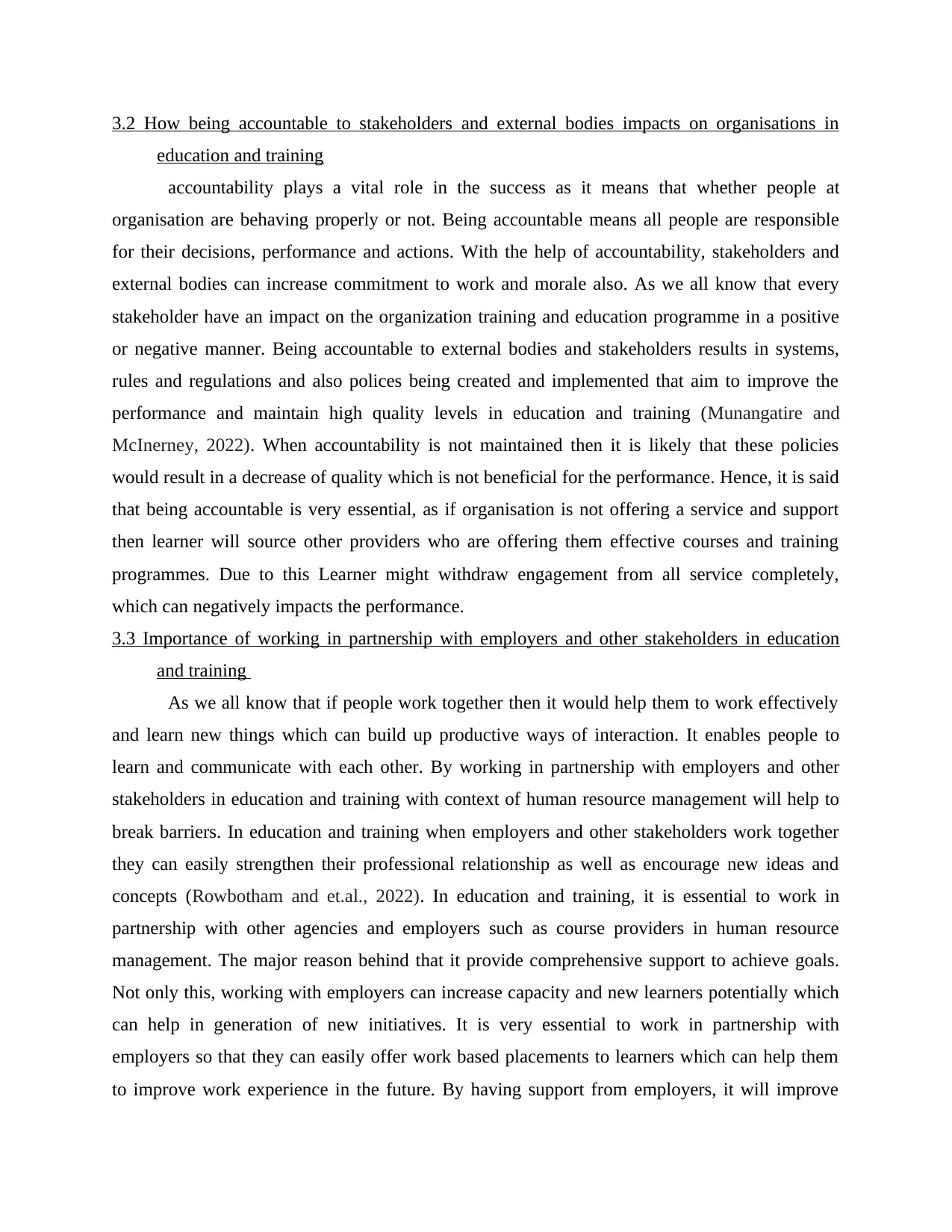
3.2 How being accountable to stakeholders and external bodies impacts on organisations in
education and training
accountability plays a vital role in the success as it means that whether people at
organisation are behaving properly or not. Being accountable means all people are responsible
for their decisions, performance and actions. With the help of accountability, stakeholders and
external bodies can increase commitment to work and morale also. As we all know that every
stakeholder have an impact on the organization training and education programme in a positive
or negative manner. Being accountable to external bodies and stakeholders results in systems,
rules and regulations and also polices being created and implemented that aim to improve the
performance and maintain high quality levels in education and training (Munangatire and
McInerney, 2022). When accountability is not maintained then it is likely that these policies
would result in a decrease of quality which is not beneficial for the performance. Hence, it is said
that being accountable is very essential, as if organisation is not offering a service and support
then learner will source other providers who are offering them effective courses and training
programmes. Due to this Learner might withdraw engagement from all service completely,
which can negatively impacts the performance.
3.3 Importance of working in partnership with employers and other stakeholders in education
and training
As we all know that if people work together then it would help them to work effectively
and learn new things which can build up productive ways of interaction. It enables people to
learn and communicate with each other. By working in partnership with employers and other
stakeholders in education and training with context of human resource management will help to
break barriers. In education and training when employers and other stakeholders work together
they can easily strengthen their professional relationship as well as encourage new ideas and
concepts (Rowbotham and et.al., 2022). In education and training, it is essential to work in
partnership with other agencies and employers such as course providers in human resource
management. The major reason behind that it provide comprehensive support to achieve goals.
Not only this, working with employers can increase capacity and new learners potentially which
can help in generation of new initiatives. It is very essential to work in partnership with
employers so that they can easily offer work based placements to learners which can help them
to improve work experience in the future. By having support from employers, it will improve
education and training
accountability plays a vital role in the success as it means that whether people at
organisation are behaving properly or not. Being accountable means all people are responsible
for their decisions, performance and actions. With the help of accountability, stakeholders and
external bodies can increase commitment to work and morale also. As we all know that every
stakeholder have an impact on the organization training and education programme in a positive
or negative manner. Being accountable to external bodies and stakeholders results in systems,
rules and regulations and also polices being created and implemented that aim to improve the
performance and maintain high quality levels in education and training (Munangatire and
McInerney, 2022). When accountability is not maintained then it is likely that these policies
would result in a decrease of quality which is not beneficial for the performance. Hence, it is said
that being accountable is very essential, as if organisation is not offering a service and support
then learner will source other providers who are offering them effective courses and training
programmes. Due to this Learner might withdraw engagement from all service completely,
which can negatively impacts the performance.
3.3 Importance of working in partnership with employers and other stakeholders in education
and training
As we all know that if people work together then it would help them to work effectively
and learn new things which can build up productive ways of interaction. It enables people to
learn and communicate with each other. By working in partnership with employers and other
stakeholders in education and training with context of human resource management will help to
break barriers. In education and training when employers and other stakeholders work together
they can easily strengthen their professional relationship as well as encourage new ideas and
concepts (Rowbotham and et.al., 2022). In education and training, it is essential to work in
partnership with other agencies and employers such as course providers in human resource
management. The major reason behind that it provide comprehensive support to achieve goals.
Not only this, working with employers can increase capacity and new learners potentially which
can help in generation of new initiatives. It is very essential to work in partnership with
employers so that they can easily offer work based placements to learners which can help them
to improve work experience in the future. By having support from employers, it will improve
Paraphrase This Document
Need a fresh take? Get an instant paraphrase of this document with our AI Paraphraser
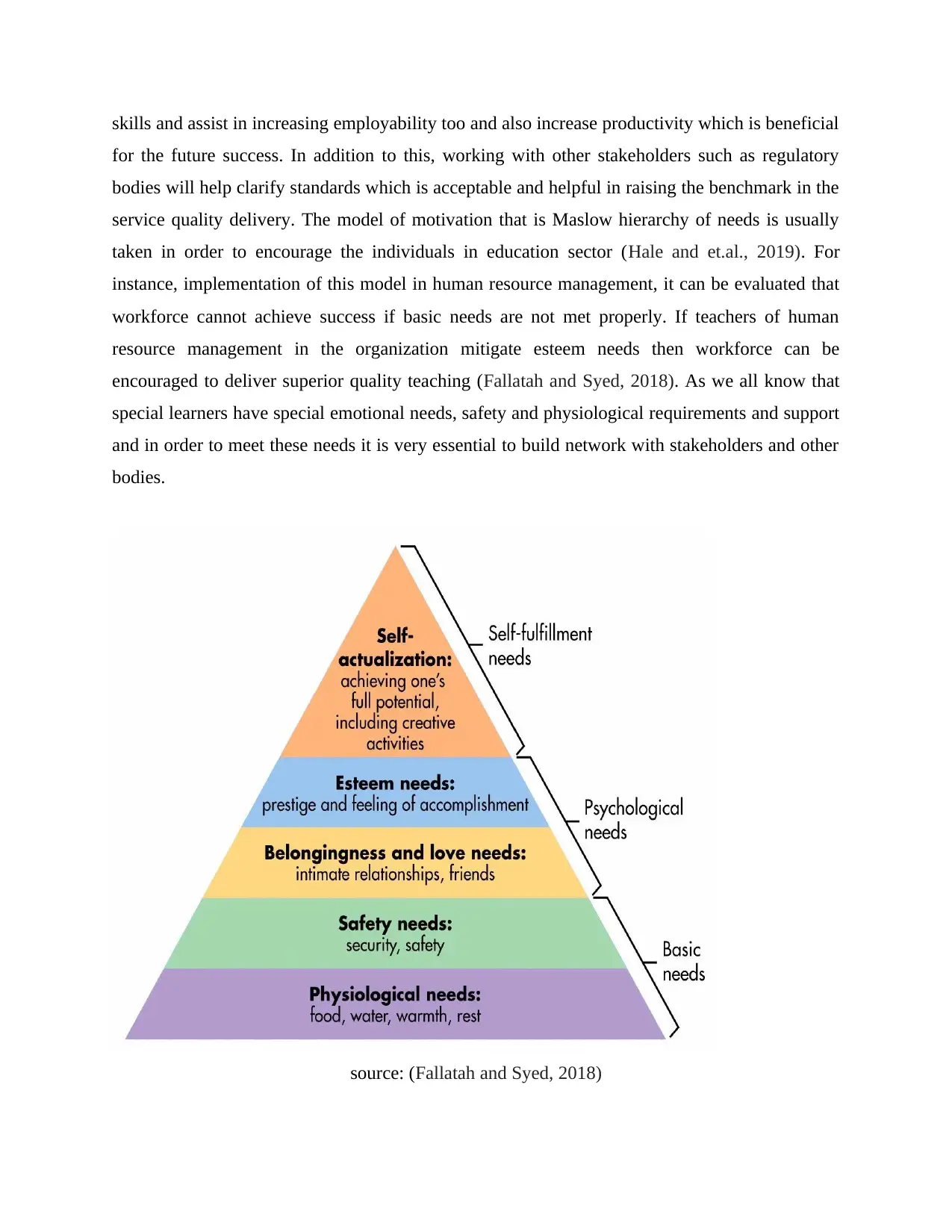
skills and assist in increasing employability too and also increase productivity which is beneficial
for the future success. In addition to this, working with other stakeholders such as regulatory
bodies will help clarify standards which is acceptable and helpful in raising the benchmark in the
service quality delivery. The model of motivation that is Maslow hierarchy of needs is usually
taken in order to encourage the individuals in education sector (Hale and et.al., 2019). For
instance, implementation of this model in human resource management, it can be evaluated that
workforce cannot achieve success if basic needs are not met properly. If teachers of human
resource management in the organization mitigate esteem needs then workforce can be
encouraged to deliver superior quality teaching (Fallatah and Syed, 2018). As we all know that
special learners have special emotional needs, safety and physiological requirements and support
and in order to meet these needs it is very essential to build network with stakeholders and other
bodies.
source: (Fallatah and Syed, 2018)
for the future success. In addition to this, working with other stakeholders such as regulatory
bodies will help clarify standards which is acceptable and helpful in raising the benchmark in the
service quality delivery. The model of motivation that is Maslow hierarchy of needs is usually
taken in order to encourage the individuals in education sector (Hale and et.al., 2019). For
instance, implementation of this model in human resource management, it can be evaluated that
workforce cannot achieve success if basic needs are not met properly. If teachers of human
resource management in the organization mitigate esteem needs then workforce can be
encouraged to deliver superior quality teaching (Fallatah and Syed, 2018). As we all know that
special learners have special emotional needs, safety and physiological requirements and support
and in order to meet these needs it is very essential to build network with stakeholders and other
bodies.
source: (Fallatah and Syed, 2018)
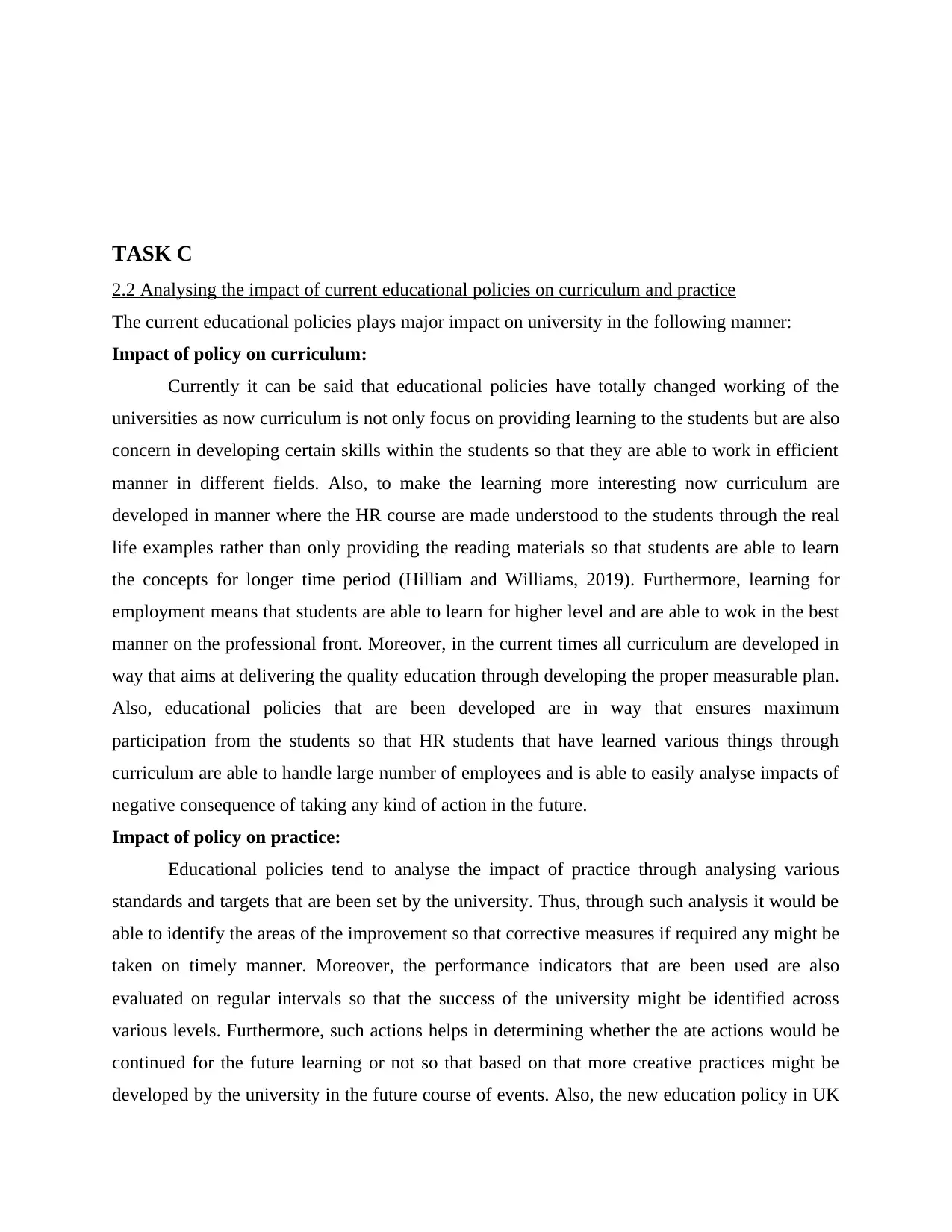
TASK C
2.2 Analysing the impact of current educational policies on curriculum and practice
The current educational policies plays major impact on university in the following manner:
Impact of policy on curriculum:
Currently it can be said that educational policies have totally changed working of the
universities as now curriculum is not only focus on providing learning to the students but are also
concern in developing certain skills within the students so that they are able to work in efficient
manner in different fields. Also, to make the learning more interesting now curriculum are
developed in manner where the HR course are made understood to the students through the real
life examples rather than only providing the reading materials so that students are able to learn
the concepts for longer time period (Hilliam and Williams, 2019). Furthermore, learning for
employment means that students are able to learn for higher level and are able to wok in the best
manner on the professional front. Moreover, in the current times all curriculum are developed in
way that aims at delivering the quality education through developing the proper measurable plan.
Also, educational policies that are been developed are in way that ensures maximum
participation from the students so that HR students that have learned various things through
curriculum are able to handle large number of employees and is able to easily analyse impacts of
negative consequence of taking any kind of action in the future.
Impact of policy on practice:
Educational policies tend to analyse the impact of practice through analysing various
standards and targets that are been set by the university. Thus, through such analysis it would be
able to identify the areas of the improvement so that corrective measures if required any might be
taken on timely manner. Moreover, the performance indicators that are been used are also
evaluated on regular intervals so that the success of the university might be identified across
various levels. Furthermore, such actions helps in determining whether the ate actions would be
continued for the future learning or not so that based on that more creative practices might be
developed by the university in the future course of events. Also, the new education policy in UK
2.2 Analysing the impact of current educational policies on curriculum and practice
The current educational policies plays major impact on university in the following manner:
Impact of policy on curriculum:
Currently it can be said that educational policies have totally changed working of the
universities as now curriculum is not only focus on providing learning to the students but are also
concern in developing certain skills within the students so that they are able to work in efficient
manner in different fields. Also, to make the learning more interesting now curriculum are
developed in manner where the HR course are made understood to the students through the real
life examples rather than only providing the reading materials so that students are able to learn
the concepts for longer time period (Hilliam and Williams, 2019). Furthermore, learning for
employment means that students are able to learn for higher level and are able to wok in the best
manner on the professional front. Moreover, in the current times all curriculum are developed in
way that aims at delivering the quality education through developing the proper measurable plan.
Also, educational policies that are been developed are in way that ensures maximum
participation from the students so that HR students that have learned various things through
curriculum are able to handle large number of employees and is able to easily analyse impacts of
negative consequence of taking any kind of action in the future.
Impact of policy on practice:
Educational policies tend to analyse the impact of practice through analysing various
standards and targets that are been set by the university. Thus, through such analysis it would be
able to identify the areas of the improvement so that corrective measures if required any might be
taken on timely manner. Moreover, the performance indicators that are been used are also
evaluated on regular intervals so that the success of the university might be identified across
various levels. Furthermore, such actions helps in determining whether the ate actions would be
continued for the future learning or not so that based on that more creative practices might be
developed by the university in the future course of events. Also, the new education policy in UK
⊘ This is a preview!⊘
Do you want full access?
Subscribe today to unlock all pages.

Trusted by 1+ million students worldwide
1 out of 22
Related Documents
Your All-in-One AI-Powered Toolkit for Academic Success.
+13062052269
info@desklib.com
Available 24*7 on WhatsApp / Email
![[object Object]](/_next/static/media/star-bottom.7253800d.svg)
Unlock your academic potential
Copyright © 2020–2026 A2Z Services. All Rights Reserved. Developed and managed by ZUCOL.


